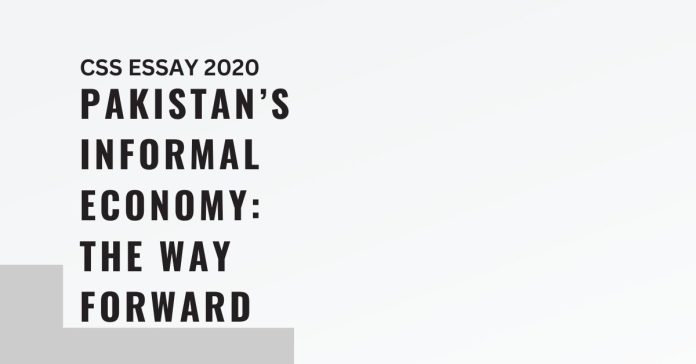Table of Contents
Thesis statement
The informal economy in Pakistan presents both challenges and opportunities, and a strategic approach is needed to harness its potential and address its drawbacks.
Introduction
The informal economy refers to economic activities that operate outside the legal and regulatory framework, often characterized by unregistered businesses, casual employment, and limited social protection. In Pakistan, the informal economy plays a significant role in employment generation and income generation, particularly for marginalized groups. However, it also presents challenges in terms of legal recognition, social security, and tax compliance. This essay explores the opportunities and challenges of Pakistan’s informal economy and proposes strategies for harnessing its potential for sustainable development.
Exposition: Understanding Pakistan’s Informal Economy
The informal economy in Pakistan is characterized by its large size and diverse nature. It encompasses a wide range of activities, including street vending, home-based work, small-scale manufacturing, and agriculture. The informality is fueled by factors such as limited access to formal employment, weak regulatory enforcement, and the informal social networks that facilitate economic transactions. Despite its prevalence, the informal economy faces limited legal protection and operates in a vulnerable environment.
Argumentation: Challenges of the Informal Economy
The informal economy in Pakistan faces several challenges that hinder its potential benefits. Firstly, informal workers lack legal recognition and protection, leading to exploitative labor practices and limited access to benefits such as minimum wages, social security, and occupational safety. Secondly, the absence of formal financial inclusion restricts access to credit and savings, hindering investment and growth. Thirdly, the informal sector’s contribution to tax evasion deprives the government of vital revenue, limiting public investment in infrastructure and social services. Lastly, the informal economy can create an uneven playing field, impacting the formal sector’s growth and competitiveness.
Argumentation: Opportunities and Benefits of the Informal Economy
Despite the challenges, the informal economy in Pakistan also offers opportunities and benefits. Firstly, it serves as a significant source of employment and income generation, absorbing surplus labor and providing livelihoods for individuals who lack formal employment options. Secondly, the informal sector demonstrates flexibility and adaptability in response to economic shocks, allowing for resilience and survival in times of crisis. Thirdly, the informal economy contributes to poverty reduction by providing opportunities for income generation and livelihood sustainability. Moreover, it acts as a breeding ground for entrepreneurship and innovation, fostering economic dynamism and creativity. Lastly, the informal economy presents avenues for economic integration and inclusive growth by providing linkages with the formal sector.
Description: Strategies for Harnessing the Informal Economy
To harness the potential of Pakistan’s informal economy, a comprehensive and strategic approach is needed. Firstly, formalization initiatives should be implemented, including simplified registration procedures, tax incentives, and legal protection for informal workers. Secondly, enhancing access to social protection and welfare programs, such as healthcare, retirement benefits, and insurance, is crucial for improving the well-being and security of informal workers. Thirdly, promoting financial inclusion through the expansion of formal banking services, microfinance, and digital payment systems can provide access to credit, savings, and financial tools for informal entrepreneurs. Fourthly, investing in education and skills development programs tailored to the needs of the informal economy can enhance productivity and enable upward mobility. Lastly, fostering collaboration and coordination between formal and informal sectors, such as supply chain integration and subcontracting arrangements, can create synergies and facilitate the gradual transition to formality.
Narration: Success Stories and Case Studies
Several countries have successfully integrated their informal economies, providing valuable lessons for Pakistan. For instance, India’s National Rural Employment Guarantee Act (NREGA) guarantees a minimum number of days of employment for rural workers, ensuring income security and poverty alleviation. Brazil’s Bolsa Familia program provides conditional cash transfers to low-income families, improving their social and economic conditions. Closer to home, the Punjab Small Industries Corporation (PSIC) has facilitated the formalization of small-scale industries in Punjab, promoting access to finance and market linkages.
Conclusion
Pakistan’s informal economy presents both challenges and opportunities. While the informal sector provides employment and income opportunities for many, it also faces issues related to legal recognition, social protection, and tax compliance. By implementing targeted strategies, such as formalization initiatives, enhanced social protection, and financial inclusion, Pakistan can harness the potential of the informal economy for sustainable development. It requires the collaboration of policymakers, stakeholders, and society at large to recognize the importance of the informal economy and work towards creating an enabling environment that fosters its growth and integration. Through these efforts, Pakistan can pave the way forward towards a more inclusive and resilient economy.


